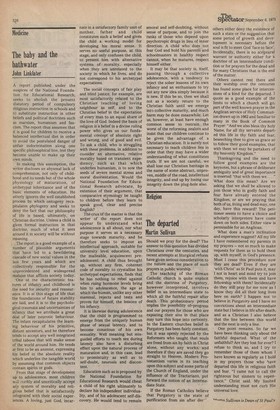The baby and the bathwater
John Linklater
A report published under the auspices of the National Foundation for Educational Research, seeks to abolish the present slatutory period of compulsory religious instruction in schools and to substitute instruction in other beliefs and political doctrines such as marxism, humanism and fascism. The report thus assumes that it is good for children to receive a balanced intellectual diet in order to avoid the postulated danger of unfair indoctrination along one specific philosophical line, lest they become unable to make up their own minds. In making this assumption, the writer discloses an abysmal lack of comprehension, not only of childhood and its needs but of the whole physiology of maturation, of archetypal inheritance and of the basic elements of education. He utterly ignores the well established process by which ontogeny recapitulates phylogeny and seeks to deny the fact that our philosophy of life is based, ultimately, on Christian doctrine. Unless a child is given formal instruction in that doctrine, much of what it sees around it in society will be without meaning. The report is a good example of a number of plausible arguments that have led to a bewildering cascade of new social values in the last few years and which are collectively responsible for the unprecedented and widespread malaise that afflicts society today. -One of the characteristic features of infancy and childhood is the need for security and reassurance. It is at this stage of life that the foundations of future stability are laid, and it is to the psychological traumata and uncertainties of infancy that we attribute a great deal of later neurotic behaviour. The infant recapitulates the learning behaviour of his primitive, distant ancestors, and he therefore tends to accept any well integrated tribal taboos that will make sense of the world around him. He tends at first to be an animist, expressing his belief in the absolute reality which underlies the tangible world by assuming that common objects contain spirits or gods. From that stage of development up to adolescence, most children w.;I readily and uncritically accept
any system of morality and refl..
gnous belief that is satisfactorily integrated with their social experiences. A loving, just God, incar nate in a satisfactory family unit of mother, father and child constitutes such a belief and gives the child a working model for developing his moral sense. It serves no useful purpose, at this stage, and only confuses the child, to present him with alternative systems of morality, especially when they are unrelated to the society in which he lives, and do not correspond to his archetypal expectations.
The social concepts of fair play and blind justice, for example, are most satisfactorily related to the Christian teaching of loving neighbour as self, and to the Christian belief in the expectation of every man to an equal share of the love of God. Indeed the basis of religion is a belief in a divine ruling power who gives us our fundamental concept of absolute right and wrong, and of good and evil. To ask a child, who is struggling with these problems, in addition to consider an alternative, relative morality based on transient expediency, such as that which underlies humanism, is to sow the seeds of severe mental stress and moral disorientation. Would the National Foundation for Educational Research advocate, by extension of their argument, that comparative etymology be taught to children before they learn to speak good, clear and precise English? The crux of the matter is that the writer of the report does not appear to understand what adolescence is all about, nor what purpose it serves as a necessary stage towards maturity, and he therefore seeks to impose an intellectual approach, suitable for university level education, upon the malleable, acquiescent preadolescent. A child thus brought up, without any firm, coherent code of morality to crystallise his archetypal expectations, finds that he has nothing to rebel against when rising hormone levels bring him to adolescence, the age at which the human, unlike any other mammal, rejects and tests and proves for himself, the lessons of his infancy. It is likewise during adolescence that the child is programmed to emerge from the uniquely human phase of sexual latency, and to become conscious of his own sexuality. Well meaning but misguided efforts to teach sex during latency also have a disturbing effect upon the natural process of maturation and, in this case, lead to promiscuity as well as to self-doubt, neurosis and discontent..
Education such as is proposed by the National Foundation for Educational Research would cheat a child of his right ultimately to declare his independent individuality, and of his adolescent self-discovery. He would tend to remain amoral and self-doubting, without sense of purpose, and to join the ranks of those who depend upon psychotropic drugs in lieu of inner direction. A child who does not fear God and hold his parents and schoolmasters in healthy respect cannot, when he matures, respect himself either. It may be that society is, itself, passing through a collective adolescence, with a tendency to reject the sober lessons of its own infancy and an enthusiasm to try out any new idea simply because it is new. If this be so, then we shall not as a society return to the Christian faith until we emerge into collective maturity, and much harm may be done meanwhile. Let us, however, at least have enough common sense to restrain the worst of the reforming zealots and insist that our children continue to be given the advantage of a Christian education. It is surely not necessary to teach children lies in order that they may have a wider understanding of what constitutes truth. If we are not careful, we shall lose our Christian heritage in the name of some abstract, unproven, middle of the road, intellectual integrity, and end up by losing our integrity down the plug-hole also.


































 Previous page
Previous page